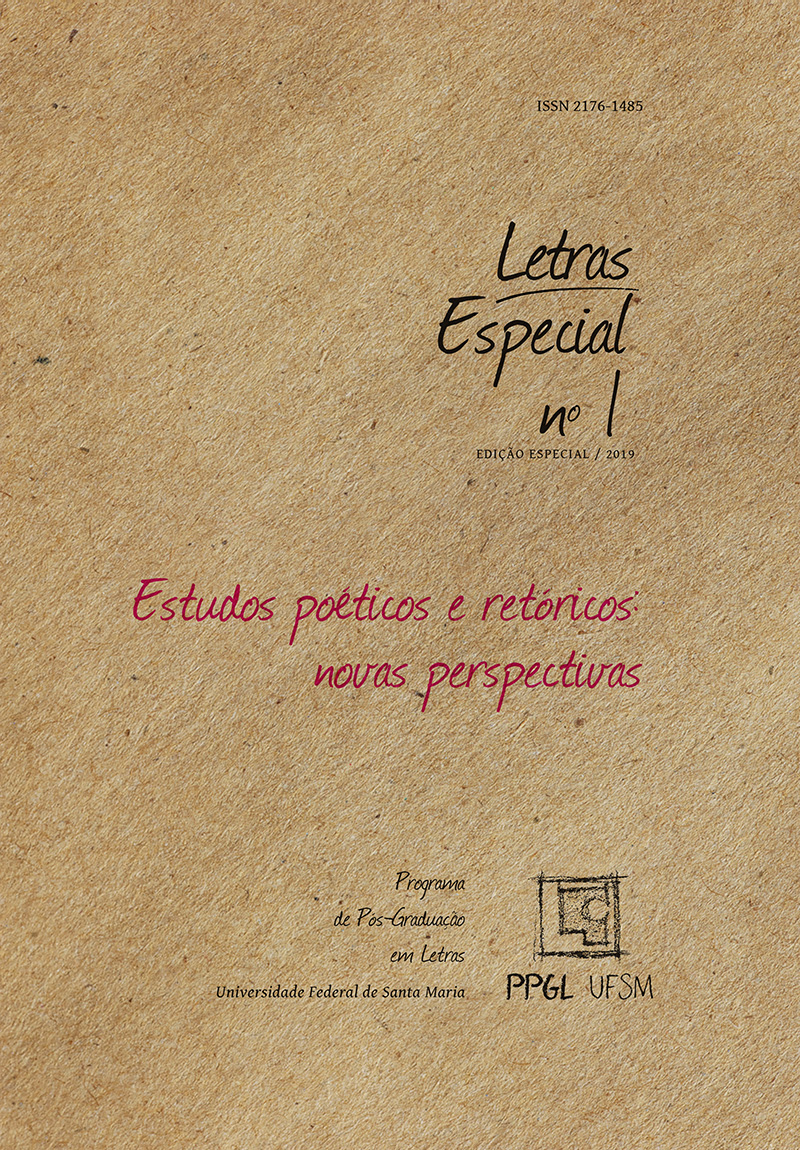“My Soul’s Imaginary Sight”: renaissance poetics and the notion of imagination
DOI:
https://doi.org/10.5902/2176148538048Keywords:
Imagination, Renaissance poetics, PhantasiaAbstract
In the 16th and 17th centuries, the conceptual significance of “imagination” was indebted primarily to Aristotle’s theory of the phantasia, translated as imaginatio and thoroughly discussed in treatises on poetry, rhetoric and philosophy. In this text, I intend to briefly explore some ideas concerning the historical specificity of the notion of “imagination” in Renaissance poetics, attempting to avoid a transhistorical approach to the study of poetry and its interpretation. In order to do this, I will present specific passages from Philip Sidney’s The Defense of Poetry (1595), Francis Bacon’s The Advancement of Learning (1605) and Shakespeare’s works.Downloads
References
ARISTOTLE. De anima. Ed. and Tr. by W. D. Ross. Oxford: Clarendon, 1984.
ARISTOTLE. Poetics. Ed. and Tr. by S. Halliwell. Harvard: Harvard U.P., 1995.
BACON, Francis. The Advancement of Learning. Auckland: The Floating Press, 2010.
BALDWIN, T.W. William Shakspere's Small Latine & Lesse Greeke. Illinois: University of Illinois Press, 1944.
BATE, Jonathan. Shakespeare and the English Romantic Imagination. Oxford: Clarendon, 1989.
BUNDY, Murray W. “Invention” and “imagination”. Renaissance Journal of English and German Philology, Illinois, v.29, n. 4, pp. 535-545, 1930.
COLERIDGE, Samuel Taylor. "Chapter 13 [Imagination] of Biographia Literaria". In: MELLOR, Anne K; MATLAK, Richard E. (ed.) British Literature 1780-1830. Harcourt Publishers, 1996.
ENGELL, James. The Creative Imagination: Enlightenment to Romanticism. Cambridge, Mass., and London: Harvard UP., 1981.
HANSEN, João Adolfo. A sátira e o engenho: Gregório de Matos e a Bahia do século XVII. 2 ed. São Paulo: Ateliê e Unicamp, 2004.
HANSEN. Alegoria: construção e interpretação da metáfora. São Paulo: Hedra, 2006.
KEATS, John. The Letters of John Keats. Cambridge: Cambridge U.P., 2011.
KESSLER, Eckhard. “The Intellective Soul”. In: SCHMITT, Charles; SKINNER, Quentin (ed.). The Cambridge History of Renaissance Philosophy. Cambridge: Cambridge U.P., 1990, pp. 485-534.
KLEIN, Jürgen. “Genius, ingenium, imagination: aesthetic theories of production from the Renaissance to Romanticism”. In: BURWICK, Frederick and KLEIN, Jürgen (Eds.). The Romantic Imagination. Amsterdam: Rodopi, 1996.
MACK, Peter. A History of Renaissance Rhetoric, 1380-1620. Oxford: Oxford U.P., 2011.
PARK, Katherine. “The Organic Soul” In: SCHMITT, Charles; SKINNER, Quentin (ed.). The Cambridge History of Renaissance Philosophy. Cambridge: Cambridge U.P., 1990, pp. 464-484.
SHAKESPEARE, William. “A Midsummer Night’s Dream”. In: SHAKESPEARE, William. The Complete Works. New York: Gramercy, 1975.
SIDNEY, Phillip. Sir Philip Sidney - The Major Works. Ed. Katherine Duncan-Jones. Oxford: Oxford World’s Classics, 2002.
SILVARES, Lavinia. Nenhum homem é uma ilha: John Donne e a poética da agudeza. São Paulo: Editora UNIFESP, 2015.
SILVARES, Lavinia. “Guerra de Olhares: Emulação e agudeza em Vênus e Adônis (1593), de William Shakespeare”. Matraga. Rio de Janeiro, v. 20, n. 3, pp. 47-69.
VICKERS, Brian. “Rhetoric and Poetics”. In: SCHMITT, Charles; SKINNER, Quentin (ed.). The Cambridge History of Renaissance Philosophy. Cambridge: Cambridge U.P., 1990, pp. 715-745.
VICKERS, Brian. English Renaissance Literary Criticism. Oxford: Oxford U.P., 2003.
WORDSWORTH, William. “Preface”. In: WORDSWORTH, William. Lyrical Ballads and Other Poems. London: Wordsworth Poetry Library, 2003.
YATES, Frances. The Art of Memory. London and New York: Routledge, 1966.
Downloads
Published
How to Cite
Issue
Section
License
Copyright (c) 2019 Letras

This work is licensed under a Creative Commons Attribution-NonCommercial-ShareAlike 4.0 International License.
Ficam concedidos a Letras todos os direitos autorais referentes aos trabalhos publicados. Os originais não devem ter sido publicados ou submetidos simultaneamente a outro periódico e não serão devolvidos. Em virtude de aparecerem nesta revista de acesso público, os artigos são de uso gratuito, com atribuições próprias, em aplicações educacionais e não comerciais.






